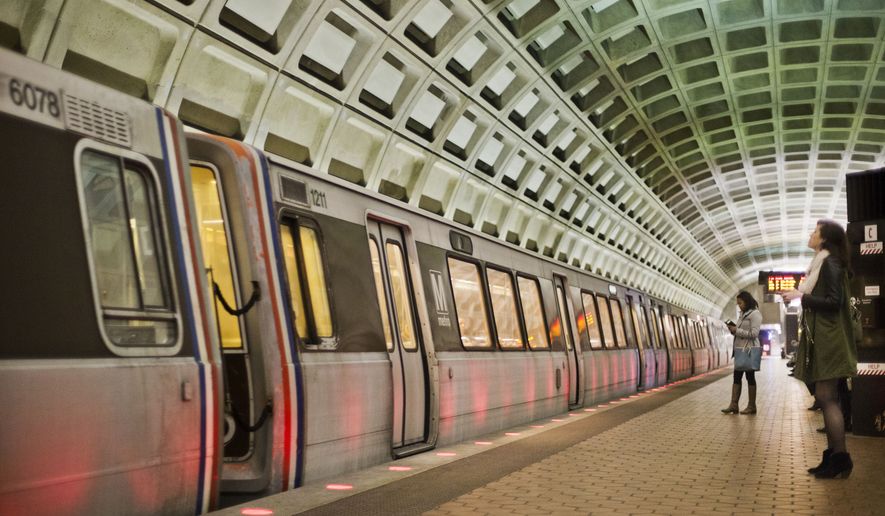The Metro Board voted Thursday to make permanent the subway system’s current hours of operation, saying the shortened hours of service are needed to perform maintenance and will remain until at least June 30, 2019.
“We’ll have to look at it again next spring,” board member Michael Goldman told The Washington Times after the vote. “Right now, the balance is on providing enough track time to increase the reliability of the system and increase the safety of the system.”
The hours of operation are 5 a.m. to 11:30 p.m. Mondays through Thursdays, 5 a.m. to 1 a.m. on Fridays, 7 a.m. to 1 a.m. on Saturdays, and 8 a.m. to 11 p.m. on Sundays.
Departure times for the first and last trains vary from station to station. At the Glenmont station on the Red Line in Silver Spring, the first trains of the day don’t arrive until 40 minutes after Metro opens. At the Wiehle-Reston East station on the Silver Line, the last train departs 10 minutes before Metro closes.
Metro Board Chairman Jack Evans, who also represents Ward 2 on the D.C. Council, told reporters he can see both sides of the issue.
“As the Ward 2 council member, people constantly complain to me that they want the late-night service back. The bars, the restaurants, they tell me lose 20 percent of their revenue, on and on and on,” Mr. Evans said. “As the Metro Board chair, that time is enormously valuable to get this system back in place.”
In the past the transit agency had single-tracked trains through construction projects rather than shut stations down or reduce service hours. Metro officials admitted in board documents this year that decision was “neither efficient nor customer friendly.”
Metro plans to use the decreased service hours for preventive maintenance like cleaning the tracks and inspecting electrical cables. Maintenance has become a perennial concern for the agency, as small track fires have persisted and federal inspectors have reported numerous, serious issues in tunnels.
Previously Metro trains rode until midnight from Sunday through Thursday, and until 3 a.m. on Fridays and Saturdays. In November 2016 the board approved “a reduction of passenger service hours to implement a preventive maintenance program,” according to board documents.
The shift isn’t likely to save the transit agency much money, as costs for late-night service exceeded revenue due to low ridership. Additionally, Metro funded a $2 million expansion of bus service at night to fill the transportation gap left by curtailing Metrorail hours.
“So it’s probably a wash. It’s probably not a saving,” Mr. Goldman said Thursday.
Currently, the transit agency has a standing agreement to allow extended, late-night service up to 10 times a year as long as someone else foots the bill. So far the Washington Capitals’ home games have taken three of those slots, as a bizarre merry-go-round of sponsors paid the $100,000 cost over the last week to ensure fans had transportation after the late-night games.
Pepco’s parent company, Exelon, was the first to pay up, followed by Uber. The Persian Gulf nation of Qatar also paid for extended service via the Downtown DC Business Improvement District.
Nearly a third of attendees to Wednesday night’s game took the Metro home, according to Mr. Evans.
Asked if the situation is sustainable, he told reporters it isn’t.
“With my Ward 2 council hat on, no, because we are busy downtown and getting busier all the time, and people really look forward to riding the Metro late at night,” Mr. Evans said. “As Metro Board hat on, yeah, we’re doing the best we can under the circumstances we have.”
• Julia Airey can be reached at jairey@washingtontimes.com.




Please read our comment policy before commenting.